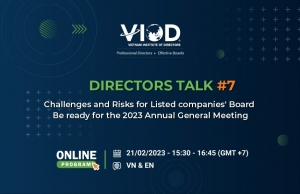Expectations rise for more professional BOD reporting
The event emphasised the challenges for corporate directors, including the roles of their independent directors and the quality of disclosure in annual reports.
 |
| Expectations rise for more professional BOD reporting, illustration photoo/ source.freepik.com |
Viewing the current situation, Phan Le Thanh Long, CEO of the Vietnam Institute of Directors (VIOD), shared that the results for the ASEAN Corporate Governance Scorecard 2021 assessment showed that Vietnam is still in the early stage of practicing the common principles of corporate governance. “The role of the board of directors (BODs) is not yet defined, as most companies are still operating in the form of a one-man firm,” he said.
According to Long, there are four main factors that make an effective BOD: composition, skills, oversight, and financial and legal compliance.
“In terms of the board’s composition, regular meetings and updates are required for both shareholders and independent directors, regardless if they hold company stocks or not. Only then can the BODs exercise their rights and responsibilities in terms of strategy development, resources provision, and supervision of the management board,” Long said.
Tran Anh Dao, deputy general director of the Management Board at the Ho Chi Minh Stock Exchange (HSX), assessed that the role of each board member, especially independent directors, have not yet been clearly expressed at AGMs.
“An example would be the lack of participation from independent directors in raising issues and drafting resolutions to present at AGMs,” Dao pointed out. “Decree No.155/2020/ND-CP mandates that the roles of each board member are routinely assessed during the AGM. There should also be an audit committee under the BOD, which is led by an independent director, who is mandated to produce a report and present at the AGM. However, we haven’t observed these activities in most meetings.”
In addition, the provision of BODs and independent directors is another problem for many Vietnamese businesses. With the lack of professional networks of directors, it has become a common practice to appoint independent directors only to comply with the law.
“We’ve observed that there are 42 listed enterprises on the HSX that have not met the required ratio of independent directors in their BOD according to Decree 155. In the coming time, the State Securities Commission (SSC) will pay closer attention to this issue and implement a fine for violation,” Dao of HSX emphasised.
“However, more than a financial punishment, companies should comply with international regulations for their own reputational benefit and long-term development.”
VIOD’s Long shared that one of the good corporate governance practices is that the chairman is an independent director.
“Some of the most important skill sets for them include legal and financial skills. The chairman can act as an expert to coordinate and operate a BOD to meet international standards and establish a good culture of corporate governance. Gradually, that culture will reflect on business efficiency and sustainable development, especially for listed enterprises,” Long said.
Ha Thu Thanh, chairperson of both Deloitte Vietnam and VIOD, highlighted the importance of a set of regulations and interactive culture within a BOD, crediting it as the key factor to maintain sustainable corporate governance.
“The first step in finding a qualified independent director is to be able to quantify and measure the compatibility,” said Thanh. “I’m a firm believer in the fact that once companies build themselves a sound practice of corporate governance, talented candidates will find them.”
Tran Thi Thuy Ngoc, deputy CEO of Deloitte Vietnam, raised a few key points that need improvement in Vietnamese listed companies’ annual reports, according to the 2022 voting results.
“The number of reports in English is still low, and the lack of BOD list and ownership ratio of the subsidiaries is substantial. While financial statements are still limited in terms of content, business results evaluation, financial indicators, sustainability reports, and considerations of environmental, social, and governance (ESG) criteria are only limited to the purpose of compliance and announcement,” Ngoc said.
In terms of sustainability reports, Vietnam began to adopt the trend around 2015 and, by last year, a number of regulations on sustainability have been published, along with the global shift from voluntary to authoritative ESG and climate disclosure.
While a number of Vietnamese listed companies have taken the initiatives to publish a separate report on their sustainability efforts, these few attempts often lack specific description of ESG risk management, process for reporting information collection, and comparisons between periods and industries. Few reports analysed the impacts of the value chain. In addition, there is a missing link between businesses’ sustainability strategy and activities.
“In many cases, the problem is not about businesses carrying out ESG efforts, but they fail to bring out the best results in their reporting. Hence, they will not be able to provide value for their investors, banks, or even their own employees, as well as customers and other stakeholders, who would use these reports for various purposes,” Ngoc assessed. “That is something that can be improved upon in this coming reporting season.”
Dao of HSX noted that in the near future, as a circular on information disclosure is refined, there would be more criteria and standards for sustainability reporting.
“The end goal is for foreign and domestic investors to gain a more transparent and objective view of Vietnamese listed companies,” Dao said, revealing that the HSX is working on a training course for listed companies on ESG reporting in March, in collaboration with the SSC and the International Finance Corporation.
In the meantime, Ngoc of Deloitte Vietnam offered advice for BODs to prepare better corporate reports for the upcoming season.
“They should get ready for stricter requirements on ESG reports and be prepared for more quantitative information. In addition, they need to ensure key personnel are well-equipped and familiar with new standards. Companies should also invest in an information system for their future development,” Ngoc recommended.
 | BOD operations under scrutiny ahead of AGM season February is the peak season for businesses to prepare for their AGMs, with one of the top concerns, for domestic and foreign investors alike, being the roles of independent members of the board of directors and the quality of disclosure in corporate reports. |
 | BOD operations under scrutiny ahead of AGM season February is the peak season for businesses to prepare for their AGMs, with one of the top concerns, for domestic and foreign investors alike, being the roles of independent members of the board of directors and the quality of disclosure in corporate reports. |
What the stars mean:
★ Poor ★ ★ Promising ★★★ Good ★★★★ Very good ★★★★★ Exceptional
 Tag:
Tag:
Related Contents
Latest News
More News
- PM outlines new tasks for healthcare sector (February 25, 2026 | 16:00)
- Ho Chi Minh City launches plan for innovation and digital transformation (February 25, 2026 | 09:00)
- Vietnam sets ambitious dairy growth targets (February 24, 2026 | 18:00)
- Masan Consumer names new deputy CEO to drive foods and beverages growth (February 23, 2026 | 20:52)
- Myriad risks ahead, but ones Vietnam can confront (February 20, 2026 | 15:02)
- Vietnam making the leap into AI and semiconductors (February 20, 2026 | 09:37)
- Funding must be activated for semiconductor success (February 20, 2026 | 09:20)
- Resilience as new benchmark for smarter infrastructure (February 19, 2026 | 20:35)
- A golden time to shine within ASEAN (February 19, 2026 | 20:22)
- Vietnam’s pivotal year for advancing sustainability (February 19, 2026 | 08:44)






















 Mobile Version
Mobile Version